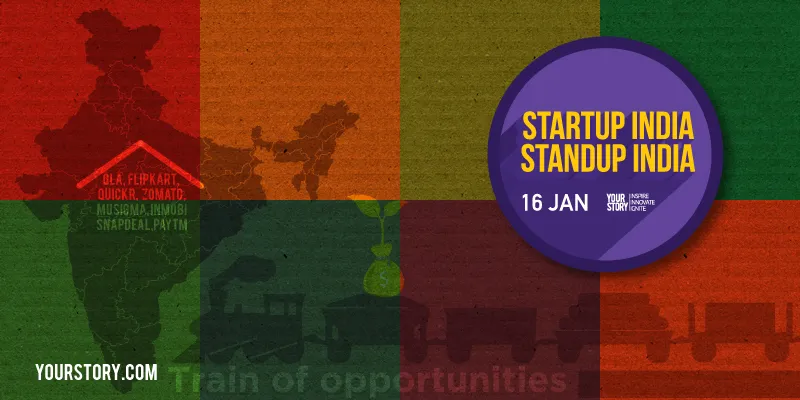16 reasons why India is already the next startup nation
Prime Minister Narendra Modi in his last 'Mann Ki Baat' radio programme in December 2015 has promised to unveil the action plan for 'Startup India, Standup India!' on January 16. This could be a reason to cheer for the Indian startup community. We have a promise of difficulties coming to an end when it comes to starting up. In a comparison of per capita GDP, with $7,594 China's per capita GDP is almost five times that of India, which stands at $1,596. However, all that is set to change as the government opens up and adapts to new startup-friendly policies.

We bring you some of the reasons why we believe this would be the right time to start up in India.
- This year, the total funding in India is about $ 9 billion, which is more than the GDP of Andaman and Nicobar, Sikkim, Arunachal Pradesh, Mizoram and Manipur combined.
- If Flipkart, our poster boy for e-commerce, were an Indian State, its valuation would be higher than the GDP of 13 States (Union Territories included). That is more than nearly half of the Indian States and Union Territories combined.
- India has the ninth largest GDP in the world, with around $2.07 trillion. With over 70 per cent of the population still living in villages, a huge portion of our GDP comes from Tier I and II cities, which means we still have huge potential to be tapped in villages.
- Snapdeal's valuation is more than Vedanta or Grasim or GSK, companies which have been in existence for decades now.
- Indian rail is the largest public sector enterprise in the country. It is also the eighth biggest employer in the world, with over 1.4 million people. Inefficient reservations, streamlining the process, catering are still some of the problems which can be looked at as opportunities and can warrant startups of a different scale.
- India is home to 5.7 per cent of the world's Unicorns - startups that are valued at over $1 billion. When compared to the amount of funding available overseas, a very small portion of it is available to India and the amount is still growing. India's Unicorns are Flipkart, Snapdeal, Ola, Paytm, Quikr, Zomato, Mu Sigma, and InMobi.
- Seventeen finance companies received funding in 2015, of over $290 million, making this one of the most funded sectors of last year and also one showing great promise. With relaxed RBI guidelines in relation to payments banks, this is a new avenue for startups to innovate.
- Eleven companies in the B2C commerce space received funding to the tune of $3.377 billion, which also means that over 33 per cent of the funding last year was in these companies and over 50 per cent of these were Unicorns.
- Rural India is a huge market for startups, and the only way to tap this market is to go local. Going into vernacular languages is one of the best ways to capture this market. Presenting the same solutions, be it hyperlocal or e-commerce or even payments, in a different packaging around local languages will help people in Tier-III and rural areas adopt it. Indian entrepreneurs are at a distinct advantage in comparison to foreign players entering the space and trying the same solutions.
- According to the World Bank's Doing Business report, India was ranked 120 in 2008 and has slowed to 132 in 2014. The ranking has improved to 130 in 2016 and is poised to improve further considering a startup-friendly government.
- In the recent times, many States have come up with startup initiatives, with Karnataka being the first to come up with a startup policy, followed by Andhra Pradesh and Rajasthan. Kerala decided to invest one per cent of its budget for entrepreneurship. West Bengal government has tied up with IIM Calcutta to send training officials to different districts to assist entrepreneurs. Likewise, the State governments of Maharashtra, Gujarat, Telangana, Andhra Pradesh, Tamil Nadu and Delhi have taken steps to promote entrepreneurship in various ways.
- 2015 marked the entry of Flipkart founders Sachin Bansal and Binny Bansal into the Forbes list of billionairs. This year is on the way to making more billionaires in the ecosystem.
- According to the World Startup Gnome Project 2015, Bengaluru is the fifth best city in the world to start up.
- Due to the vague and varying definitions of the word 'startup', it is quite difficult to perfectly mark the contribution of our startups towards the GDP of the country. However, there are chances that with the launch of the national startup policy, we would be able to precisely measure the contribution of startups towards the economy.
- The government of Kerala has been progressive on the entrepreneurship front, by providing extra marks for entrepreneurship and promoting startups with initiatives such as startup village with easy access to mentoring and other facilities.
- In 2014, Facebook acquired Little Eye Labs; in 2015, Twitter acquired Zipdial. Little Eye Labs was the first Facebook acquisition from India. With greater support from the government, we are going to see more of such startup acquisitions from India, which will further strengthen our technological prowess. Last year also bolstered the attention of traditional businessmen and investors towards the ecosystem, leading to big names like Ratan Tata and TV Mohandas Pai investing in startups.
To know what the startup ecosystem expects of the government, click here.
YourStory is a proud partner of the Government of India’s ‘Start-up India’ movement, to be launched on 16 January 2016 in New Delhi.








